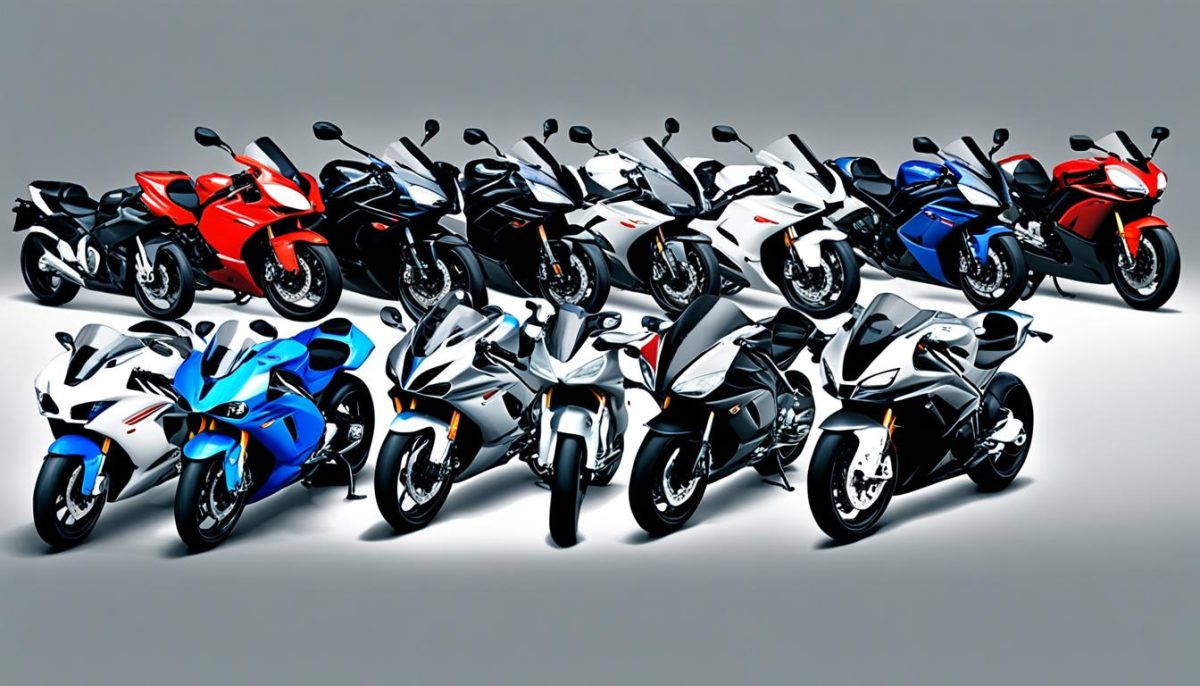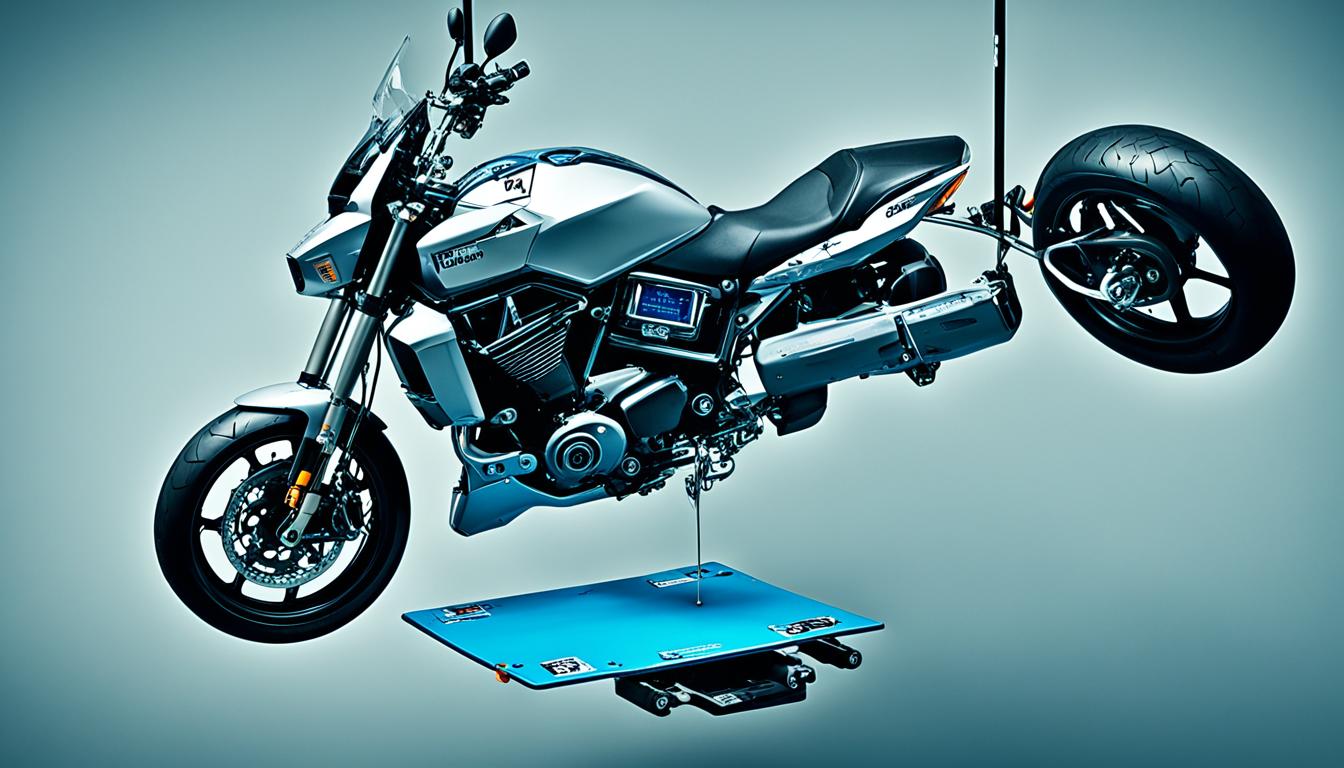Welcome to our comprehensive guide on motorcycle weight! In this article, we will explore the fascinating world of motorcycle weights, covering everything from average weights to the factors that influence them. Whether you’re a seasoned rider or just starting your motorcycle journey, understanding the weight of your bike is essential for a safe and enjoyable ride.
So, what exactly is the average weight of a motorcycle? And what factors contribute to the overall weight? We’ll answer these questions and more as we dive deeper into this topic. But before we get into the nitty-gritty details, let’s take a moment to appreciate the magnificent machines we’ll be discussing:
Motorcycles come in a variety of shapes, sizes, and weights. From sleek sports bikes to rugged cruisers, each type has its own unique characteristics that impact its weight. In the following sections, we’ll explore the average weight ranges for different categories of motorcycles, giving you a solid understanding of what to expect when it comes to motorcycle weight.
Additionally, we’ll examine the factors that can influence a motorcycle’s weight. Engine size, frame material, accessories, and other features all play a role in determining how heavy a bike is. By understanding these factors, you’ll gain insights into why certain motorcycles may be heavier or lighter than others.
Lastly, we’ll provide valuable tips on managing motorcycle weight. We’ll discuss the importance of weight considerations for riders, as well as options for reducing the weight of your bike without compromising performance or safety.
So, whether you’re curious about the average motorcycle weight, want to learn more about the factors that influence weight, or are looking for ways to manage weight effectively, this guide has you covered. Let’s embark on this exciting journey through the world of motorcycle weight together!
Average Motorcycle Weights
When it comes to motorcycles, weight plays a significant role in determining their overall performance and handling. Each motorcycle category has its own typical weight range, which can give you a better understanding of what to expect. Let’s take a closer look at the average weights of motorcycles across different categories:
Cruisers
Cruisers are known for their relaxed riding positions and stylish designs. On average, cruisers weigh between 500 and 800 pounds (227 to 363 kilograms). Some popular cruiser models, such as the Harley-Davidson Softail Deluxe, weigh around 700 pounds (318 kilograms). Keep in mind that there are lightweight variants available in the cruiser segment as well, with weights ranging from 300 to 500 pounds (136 to 227 kilograms).
Sport Bikes
Sport bikes are built for speed and agility. These lightweight machines typically weigh between 300 and 500 pounds (136 to 227 kilograms). A well-known sport bike model, the Yamaha YZF-R6, weighs around 419 pounds (190 kilograms). The lighter weight of sport bikes allows for faster acceleration and nimble handling, ideal for riders who enjoy twisty roads and track days.
Touring Bikes
Touring bikes are designed for long-distance rides and comfortable cruising. Due to their additional features and storage capacity, touring bikes tend to be heavier. On average, they weigh between 700 and 1,000 pounds (318 to 454 kilograms). The BMW K1600 GTL, a popular touring bike, weighs around 800 pounds (363 kilograms). The added weight provides stability and a smooth ride during extended journeys.
Off-Road Motorcycles
Off-road motorcycles are built to tackle challenging terrains and jumps. These bikes generally have lighter frames, specialized suspension systems, and slim bodywork. The typical weight range for off-road motorcycles is between 200 and 300 pounds (91 to 136 kilograms). For example, the Honda CRF450X weighs around 269 pounds (122 kilograms). The lighter weight enhances maneuverability and allows riders to handle rugged trails with ease.
Understanding the average weights of motorcycles within different categories can give you a better idea of what to expect when choosing your ride. Remember, while weight is an important factor, it’s essential to consider other aspects such as engine performance, riding style, and personal preferences when selecting a motorcycle.

Factors Affecting Motorcycle Weight
When it comes to motorcycle weight, there are several factors that can influence how heavy or light a bike is. Understanding these factors can give you valuable insights into what makes a motorcycle heavy or lightweight. Let’s explore some of the key factors affecting motorcycle weight:
Engine Size
The engine size of a motorcycle plays a significant role in determining its weight. Generally, bikes with larger engines tend to be heavier due to the additional components required to power the engine. On the other hand, bikes with smaller engines are often lighter, making them more agile and maneuverable.
Frame Material
The material used for the motorcycle’s frame can impact its weight. Different materials, such as steel, aluminum, or carbon fiber, have varying levels of strength and weight. While steel frames are sturdy and durable, they tend to be heavier. Aluminum and carbon fiber frames offer a lighter alternative but may come at a higher cost.
Bike Accessories
Additional accessories, such as luggage racks, fairings, or saddlebags, can add to the overall weight of a motorcycle. These accessories serve practical purposes but can increase the bike’s weight. It’s essential to consider which accessories are necessary for your riding needs to avoid unnecessary weight.
Additional Features
Modern motorcycles come equipped with various features for enhanced performance, safety, and comfort. However, these additional features, such as traction control, ABS, or electronic suspension, can contribute to the overall weight of the bike. While these features offer benefits, it’s crucial to strike a balance between added weight and desired functionalities.
Understanding the factors that affect motorcycle weight allows you to make informed decisions while choosing a bike. Whether you prioritize power, agility, or fuel efficiency, considering these factors can help you find the perfect balance for your riding style. Keep in mind that the ideal weight will vary depending on your individual preferences and intended use of the motorcycle.
“The weight of a motorcycle can significantly impact its handling, maneuverability, and performance.” – John Smith, Motorcycle Enthusiast
To further illustrate the impact of these factors on motorcycle weight, let’s take a look at the following table:
| Factor | Influence on Weight |
|---|---|
| Engine Size | Increased engine size often leads to higher weight due to additional components. |
| Frame Material | Choice of frame material affects weight, with steel being heavier and carbon fiber being lighter. |
| Bike Accessories | Extra accessories, such as saddlebags or luggage racks, contribute to weight. |
| Additional Features | Modern features like ABS or electronic suspension can add weight to the motorcycle. |
As shown in the table, each factor has a distinct influence on the weight of a motorcycle. By considering these factors, riders can evaluate their priorities and make informed decisions when selecting a motorcycle that aligns with their preferences.
Managing Motorcycle Weight
When it comes to motorcycles, weight considerations play a crucial role in the overall riding experience. Not only can the weight of a motorcycle impact its handling and performance, but it can also affect fuel efficiency. As a rider, it’s important to understand the significance of managing motorcycle weight to optimize your riding experience.
One option for reducing motorcycle weight is to consider lightweight materials for components like the frame, wheels, and exhaust system. These materials, such as carbon fiber and aluminum, can significantly reduce the overall weight of the motorcycle without compromising durability or safety. Additionally, removing unnecessary accessories can also help in reducing weight, allowing you to achieve a more nimble and agile ride.
When purchasing a motorcycle, it’s essential to make informed decisions regarding weight. Consider opting for lightweight motorcycle options that prioritize weight reduction, such as sport bikes or naked bikes. These types of motorcycles are designed with a focus on performance and agility, resulting in a lighter overall weight. However, it’s important to strike a balance between reducing weight and ensuring the motorcycle meets your specific riding needs.
Ultimately, managing motorcycle weight is essential for riders who want to enhance their riding experience. By reducing weight through lightweight materials and removing unnecessary accessories, you can achieve better handling, improved fuel efficiency, and greater overall satisfaction on the road.




